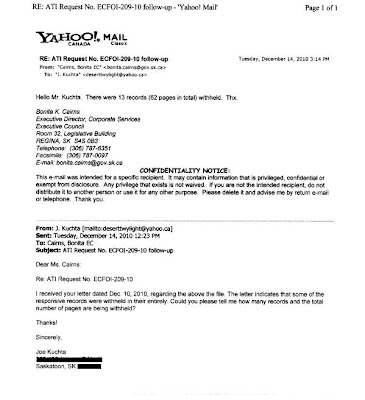Wall gov’t hiding potash task force records; Executive Council and Energy and Resources collude to deny access to over 100 pages of information

When you think about it, the Wall government has never tabled any potash reports, interim or final, detailing its activities and findings leading up to federal Industry Minister Tony Clement’s announcement on November 3, 2010, to reject BHP Billiton’s $38.6 billion takeover bid of Potash Corporation of
The Wall government issued six potash related news releases between September 2, 2010, and October 28, 2010 – including the so-called independent analysis by the Conference Board of Canada – and posted online the text of two speeches given by Premier Brad Wall to the Saskatchewan Chamber of Commerce in Regina on Oct. 21, 2010, and the Economic Club of Canada in Toronto on October 29, 2010.
That’s the extent of the Wall government’s transparency on the file.
In his Oct. 21 address, the premier alluded to a “task force” that had been established to review the potash issue.
“Immediately upon learning the news, the Government of Saskatchewan struck an internal task force made up of representatives, senior officials in Finance, Energy and Resources, in Justice and in
References to the task force are few and far between.
The earliest mention of the secretive group was on August 26, 2010, when the Canadian Press reported Wall saying a ‘government task force’ and an independent analysis were looking at all of the province’s options, which could include legislation.
“We need to explore, and we are, what’s possible when we issue a license to a mine, what conditions are possible to companies who are granted a license. When they’re granted that license by the
“We don’t know the scope to which we can go there yet.”
According to the article, Wall also said that finance, justice and energy and resources officials from the province were set to meet with federal officials in mid-September to discuss the situation. [Premier says
StarPhoenix reporter James Wood added a little more information in a story the next day noting it was Wall that “appointed an inter-ministerial task force to look at the issue.” Apparently the premier made the comments to reporters at a charity event he was attending in
The next mention of the task force was in the StarPhoenix on September 14, 2010, when Wall said the group had been meeting with Canpotex – the international marketing arm for
The last time the shadowy group was mentioned appears to be in an interview that Wall gave with Diane Francis, Financial Post editor at large, a couple of days later when he said the task force was investigating mining licences as a way of addressing concerns about foreigners buying Canada’s biggest resource companies, the loss of head offices, jobs, control and future growth. [
From that point on the work of the task force seemed to disappear into a black hole. The public has no idea how many times the task force met or who else it consulted.
On October 25, 2010, access to information requests were sent to Executive Council, Energy and Resources, and Enterprise Saskatchewan asking for copies of any briefing notes relating to the task force, any reports or analysis it prepared, and the minutes to any of the group’s meetings.
The three government institutions responded by refusing access to 123 pages of information:
▪
▪ Energy and Resources – access denied to 13 records, totaling 56 pages.
▪ Executive Council – access denied to 13 records, totaling 62 pages.
What’s more is that the letters from Executive Council and Energy and Resources are nearly identical suggesting that the two ministries are colluding to deny access to a significant amount of information.
The ministries claim that releasing the records would disclose a cabinet confidence; that the records contain information that is subject to solicitor-client privilege; and, if access was provided it could violate section 36 of The Investment Canada Act pertaining to privileged information.
The Wall government released just one document, a lousy two-page briefing note entitled “Blocked Takeover Bids.” The report provides a short overview of unsuccessful takeover attempts from around the world, including
Premier Brad Wall has repeatedly stated that the potash belongs to the people of











0 Comments:
Post a Comment
<< Home